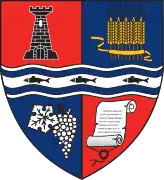Salonta
Salonta (Romanian pronunciation: [saˈlonta]; Hungarian: Nagyszalonta, colloquially Szalonta, Hungarian pronunciation: [nɒɟsɒlontɒ]; German: Grosssalontha; Turkish: Salanta) is a city in Bihor County, in the geographical region of Crișana, north-western Romania, near the Hungarian border.
Salonta
Nagyszalonta, Szalonta | |
|---|---|
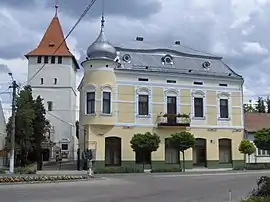 Ciunt Tower and Arany Palace | |
 Coat of arms | |
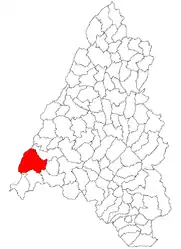 Location within Bihor County | |
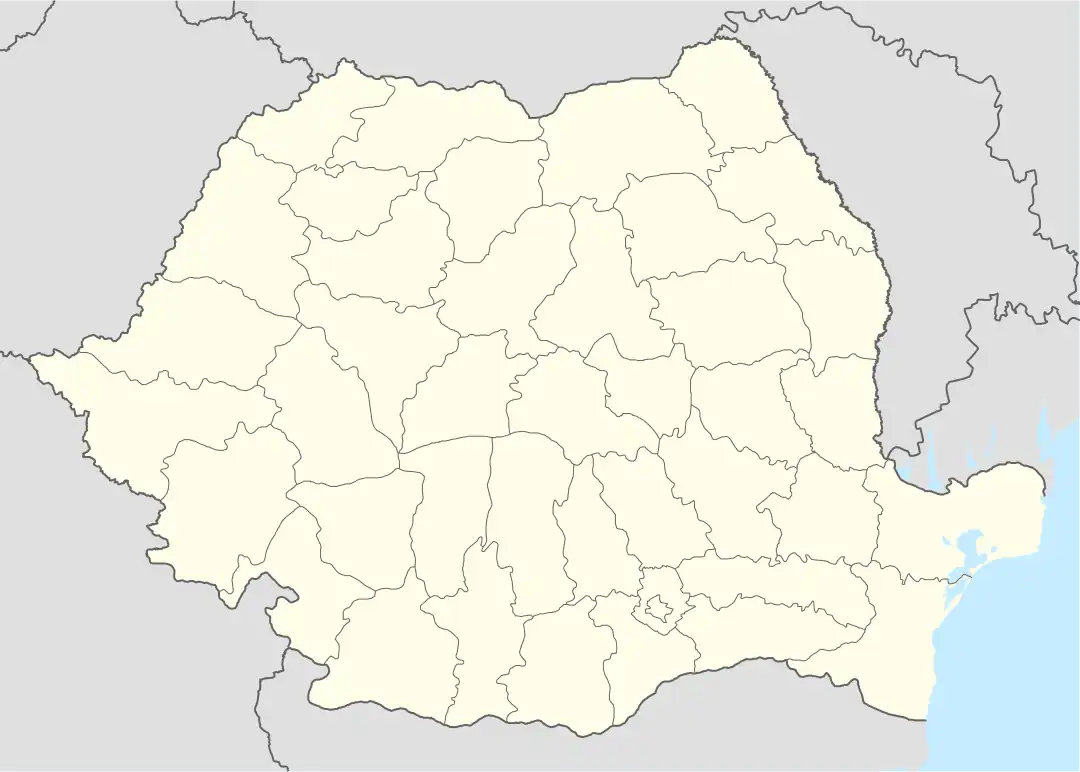 Salonta Location in Romania | |
| Coordinates: 46°48′N 21°39′E | |
| Country | Romania |
| County | Bihor |
| Government | |
| • Mayor (2020–2024) | László Török[1] (UDMR) |
| Area | 170.04 km2 (65.65 sq mi) |
| Elevation | 90 m (300 ft) |
| Population (2021-12-01)[2] | 15,792 |
| • Density | 93/km2 (240/sq mi) |
| Time zone | EET/EEST (UTC+2/+3) |
| Postal code | 415500 |
| Area code | (+40) 02 59 |
| Vehicle reg. | BH |
| Website | salonta |
Population
| Year | Pop. | ±% |
|---|---|---|
| 1910 | 15,514 | — |
| 1930 | 15,297 | −1.4% |
| 1948 | 14,447 | −5.6% |
| 1956 | 16,276 | +12.7% |
| 1966 | 17,754 | +9.1% |
| 1977 | 19,746 | +11.2% |
| 1992 | 20,660 | +4.6% |
| 2002 | 20,006 | −3.2% |
| 2011 | 17,042 | −14.8% |
| 2021 | 15,792 | −7.3% |
| Source: Census data | ||
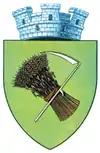
According to the 2021 census, Salonta has a population of 15,792. At the census from 2011, the city had a population of 17,042, made up of Hungarians (58.1%), Romanians (38.83%), Romani (2.4%), Slovaks (0.4%), and others (0.5%).[3] In terms of religion, at the 2002 census, 51.12% were Reformed (Calvinist), 36.46% Romanian Orthodox, 6.56% Roman Catholic and 5.86% was split between Baptists, Romanian Greek-Catholic, Pentecostals, and other faiths.[4]
History
The city, a part of the Kingdom of Hungary, was first documented in 1214 under the name of Zolonta and in 1332 a Papal document used the name Zalanta. The Hungarian spelling Szalonta was used since 1587.
Etymologically, the name is probably related with those of other Romanian localities (slavic names) like Slatina, Zlatna or Slănic, whose Romanian meaning is "Sărata" ("Saline"). It can also be derived from Hungarian "szalona" ("bacon"), a term having the same etymological meaning, and in regional context – the name of two contiguous villages are probably related with the types of stock growth in the area: Mădăras, from Hungarian "madar" ("bird"), and Tulca from Hungarian "tulok" ("bullock") – it may refer to the numerous pig growers in its perimeter.
Until the 16th century, it was only a small village of about 300 inhabitants and was on the land of the Toldi family. A bigger city was the fort of Culiser, which was however destroyed by the Turks in 1598.
Culiser was never rebuilt and Salonta began to have a more important role in the region after 1606, when the prince of Transylvania, Stephan Bocskai settled 300 soldiers here and appropriated land for them. They built their own farms, but had to keep their arms ready to repel an attack by the Turks. 3 June, the day in which the soldiers were settled, is nowadays declared "the day of the city". However, Ottoman Turks captured the town in 1660 and as "Salanta", it became the sanjak center of Varat vilayet until 1692.
The 19th century Hungarian poet János Arany was born and lived in Salonta for most of his life. Lajos Zilahy, another noted Hungarian author, was also born in Salonta in 1891. Violist and musicologist Egon Kenton was born there the same year.
Salonta, along with all of Transylvania, became part of Romania with the 1920 Treaty of Trianon. From 1940 to 1944, as a result of the Second Vienna Award, it formed part of Hungary; after the Second World War, the Paris Peace Treaties reaffirmed the Trianon border.
Climate and geography
Salonta has a continental humid climate, with warm to hot summers and cold to very cold winters, but relatively little snow. The average annual precipitation is 578 cubic mm (35.2 inches).[5] The average January temperature is −2.4 °C (27.7 °F) and in July it is 20.7 °C (69.3 °F) (averages for low and high). It is located in the plains west of the Apuseni Carpathians at an elevation between 91 and 100 m (299 and 328 ft).
Economy
Salonta is famous nationwide for its Salam de Salonta sausage products that have been produced since the 1970s. Most of the state-owned factories built during the communist period went into bankruptcy since 1989. During the 2000s however, there has been a considerable foreign direct investment in small factories and assembly plants – particularly in the clothing industry.
In 2008, Inteva Products LLC – a large multinational – started production at its Salonta facility, the only one the company has in Romania and one in only five throughout Central and Eastern Europe. Inteva produces cables and latches and other car parts at the Salonta facility.[6]
Trivia
The city of Salonta hosted the 2006 Romanian National Gliders Championship (Campionat naţional de aeromodelism) and its team, Metalul Salonta, has won the championship several times.[7]
Politics
The Salonta Municipal Council, elected in the 2012 local government elections, is made up of 17 councillors, with the following party composition:
| Party | Seats in 2012 | Current Council | |||||||||||||
|---|---|---|---|---|---|---|---|---|---|---|---|---|---|---|---|
| Democratic Alliance of Hungarians in Romania | 13 | ||||||||||||||
| Social Liberal Union | 4 | ||||||||||||||
Sports
Basketball: C.S.S. "TEODOR NES" SALONTA[8][9][10] [11]
Tengo Salonta is Salonta's football tennis team, a very successful club at national level and also the current Football Tennis Club World Cup champions, title won in 2017 after a 3–1 in the final against Czech club from Karlovy Vary, the host of the tournament.[12]
Football is also a sport with a long tradition in the town situated near the Hungarian border. Olimpia Salonta is the team of Salonta, being founded in 1911, the club played mostly at Liga III and Liga IV, with 31 seasons played in the third league of the Romanian football league system.
For 10 years, between 2003 and 2013, in Salonta existed another football club, Liberty Salonta, a club with a strong academy at national level that promoted many interesting players over time, even managing a promotion to Liga I in 2006, but the club sold its place to UTA Arad and never played at the highest level of the Romanian football.
International relations
Twin towns – sister cities
Salonta is twinned with:
 Csepel, Hungary
Csepel, Hungary Hajdúböszörmény, Hungary
Hajdúböszörmény, Hungary Nagykőrös, Hungary
Nagykőrös, Hungary Rimavská Sobota, Slovakia
Rimavská Sobota, Slovakia Sarkad, Hungary (since 2001)
Sarkad, Hungary (since 2001) Túrkeve, Hungary (since 1994)
Túrkeve, Hungary (since 1994) Derecske, Hungary
Derecske, Hungary Békéscsaba, Hungary
Békéscsaba, Hungary
Image gallery
 The front of the Salonta City Hall
The front of the Salonta City Hall City Hall
City Hall Ciunt Tower
Ciunt Tower Róth House
Róth House House of Culture
House of Culture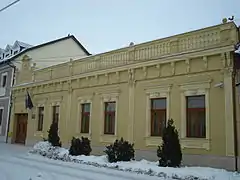 Consulate of Slovakia
Consulate of Slovakia The Court
The Court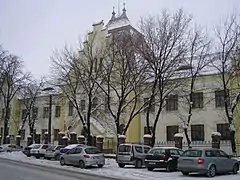
 The Peasantry Museum panorama
The Peasantry Museum panorama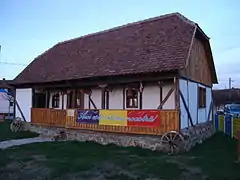 The Peasantry Museum
The Peasantry Museum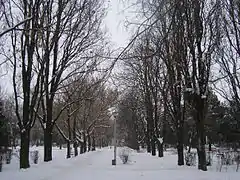 Central Park
Central Park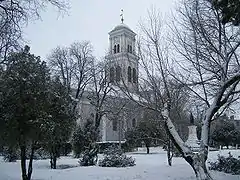 Reformed Cathedral
Reformed Cathedral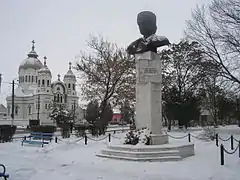 Orthodox Church
Orthodox Church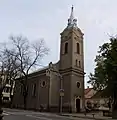 Catholic Church
Catholic Church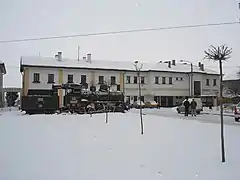 Train monument and the railway station
Train monument and the railway station Slavia Hotel
Slavia Hotel Central Hotel in 1932
Central Hotel in 1932 The railway station in 1921
The railway station in 1921._Fortepan_86679.jpg.webp) The high school in 1907
The high school in 1907 Ciunt Tower and the center of the town in 1917
Ciunt Tower and the center of the town in 1917 Reformed Cathedral and the center of the town in 1917
Reformed Cathedral and the center of the town in 1917
References
- "Results of the 2020 local elections". Central Electoral Bureau. Retrieved 9 June 2021.
- "Populaţia rezidentă după grupa de vârstă, pe județe și municipii, orașe, comune, la 1 decembrie 2021" (XLS). National Institute of Statistics.
- "Archived copy" (PDF). Archived from the original (PDF) on 16 June 2012. Retrieved 10 March 2012.
{{cite web}}: CS1 maint: archived copy as title (link) - Romanian 2002 Census
- NASA Langley Research Center Atmospheric Science Data Center; New et al. 2002, online,
- "Reuters: Arvin Meritor in Salonta, Romania". Reuters. Archived from the original on 8 March 2008. Retrieved 1 July 2017.
- Romanian Aeromodelism, Salonta Cup
- "Baschetul masculin, primul sport unde au fost desemnate finalistele Gimnaziadei 2018-2019 din toate cele opt regiuni nationale".
- "Echipele castigatoare ale Gimnaziadei 2017-2018 la baschet feminin si volei masculin, premiate in Sala Polivalenta de la Izvorani".
- "Federatia Romana de Baschet".
- "Meciuri de pregatire in Turcia pentru selectionatele U15 ale Romaniei".
- Bihorenii de la Tengo Salonta au câștigat Cupa Mondială la futnet. bihon.ro
- NASA Langley Research Center Atmospheric Science Data Center; New et al. 2002, online, http://www.gaisma.com/en/location/salonta.html
- Romanian National Aeromodelism, Salonta Cup,
